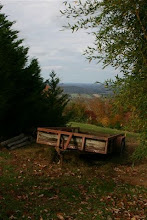And he withdrew from them about a stone's throw, and knelt down and prayed, saying, “Father, if you are willing, remove this cup from me. Nevertheless, not my will, but yours, be done.” And there appeared to him an angel from heaven, strengthening him. And being in an agony he prayed more earnestly; and his sweat became like great drops of blood falling down to the ground. Luke 22:41-44
I am prone to overlook the humanity of Jesus. In doing so, I discount the struggle He encountered in remaining obedient to His Father's will. To forget His agony in the Garden allows me to attribute His willingness to go to the cross as merely "a God thing"--He was divine and could endure anything through His divine nature. Tacitly I am saying, "My cross is too heavy for a human to bear--He could do it because He was God, but those same expectations should not be placed upon me."
If I see the cross without considering the Garden, I fail to learn the complete message of the crucifixion. He dreaded the events that were about to transpire and, in His humanity, He asked God for another way. When another way was not provided, He showed the humility of an obedient Son and went to the cross.
What do I learn from Jesus in the Garden? First, I learn that painful circumstances occur in everyone's life, even the life of God's Son. Through that I know He can commiserate with my own painful times in life. I learn that it is okay not to just stuff my feelings and "grin and bear it"--its okay to ask for relief, to seek a way out of the pain by asking God for circumstances to change. I learn that when His answer is "stay the course", constrained obedience, not angry rebellion or sullen passiveness is the proper response. And, eventually, I learn that the reward for obedience is a new perspective on the experience-- in retrospect, perhaps in this life or perhaps not until in the next, I learn why my prayer for relief was not met with the response I sought.
Oswald Chambers repeatedly exhorted his readers to "remember the Cross". Paul, in his letters, frequently plead with his gentile churches in Asia and Europe, to focus on Christ crucified. They both knew the power of the crucifixion to change each life that focuses there. God came to earth, suffered and died; and then He overcame death. That power can only be divine, and I am prone to see only the divine power, not the human suffering and the anticipatory dread that lead up to the cross. The lesson from the Garden restores the balance of "fully human, fully divine" in my view of Jesus, and gives me the courage to persevere, to humbly ask for relief, and in an equally humble spirit to ask for the constraint to be obedient through circumstances of life that are painful and temporarily unabated.
Jesus loves us and He knows what we are feeling, not only because He is omniscient but because He was in the Garden.
Lord, help us to see it is okay to ask "for this cup to pass from us" and then, if it does not, to bear our crosses obediently. Amen.
